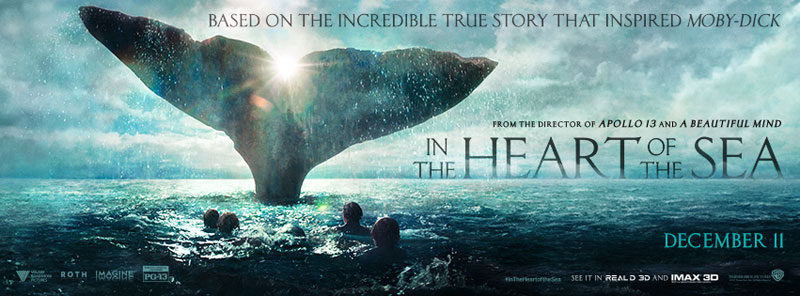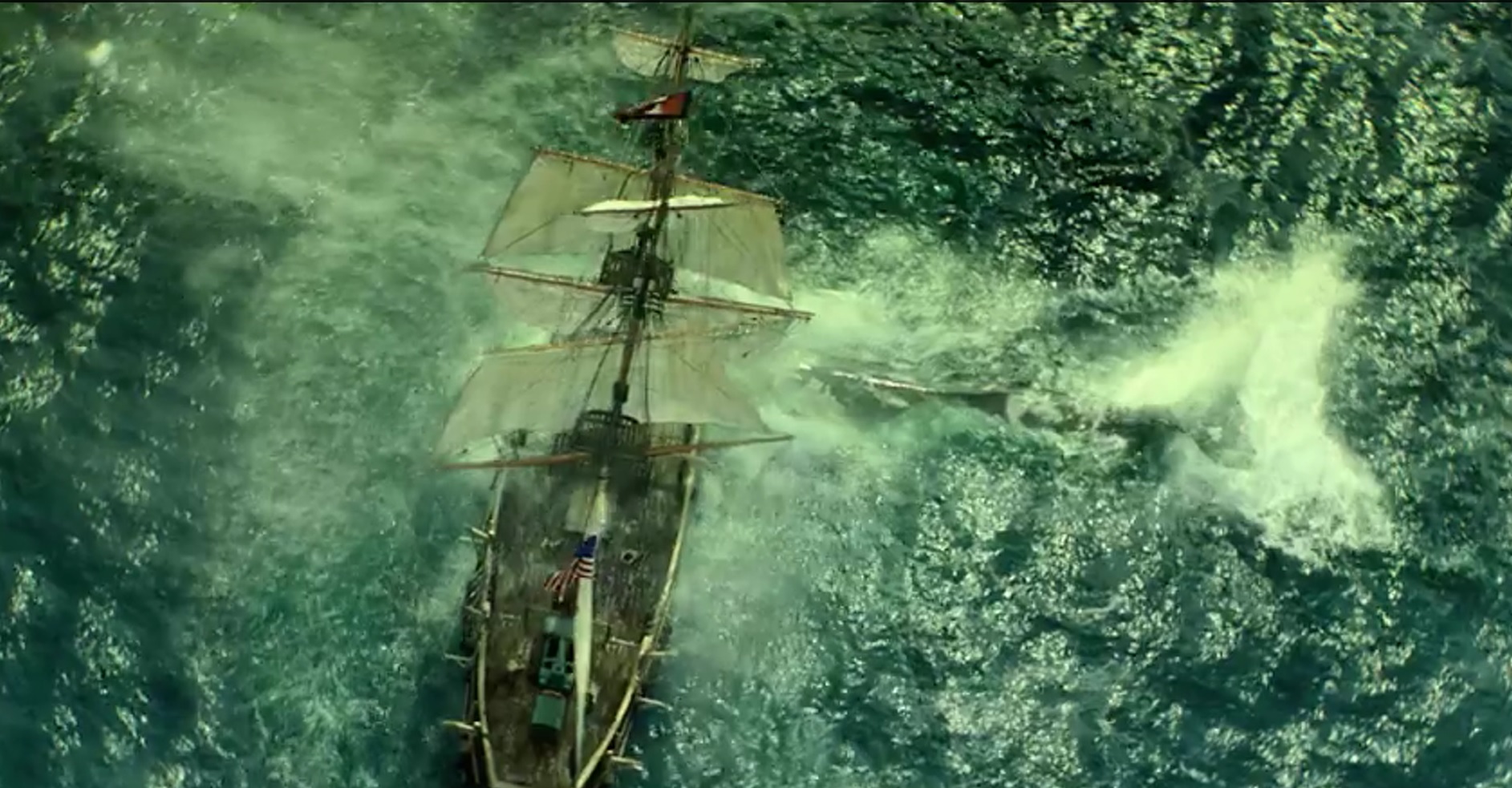
IN THE HEART OF THE SEA (PG-13)
Released by Warner Bros Pictures
Review By Adam Mast
Director Ron Howard returns with “In the Heart of the Sea,” a big, old-fashioned period piece that traces the real events that led Herman Melville (played here by Ben Whishaw) to write the 1851 literary masterwork, “Moby-Dick; or, The Whale.” Admittedly, there aren’t quite as many whale sequences as one might expect, but there’s no doubt that this is a gorgeous looking picture with plenty of visuals at which to marvel.
As “In the Heart of the Sea” opens, Melville attempts to interview lost soul, Tom Nickerson (played by Brendan Gleeson) about his ordeal aboard a whaling ship several years earlier. Upon a little prodding (and offering a hefty sum of cash to his potential subject), Nickerson eventually agrees, but the interview proves to be quite traumatic for the ex-seaman as his story is one of darkness and despair.

Through flashback, we are taken back to Nickerson’s youth as he boards a whaling ship called the Essex. This ship is commanded by a privileged George Pollard (Benjamin Walker) who assumes the position of captain despite his not having really earned the title. He acquires his command by way of his reputable family name. Meanwhile, Owen Chase (played by Chris Hemsworth) takes his position as a first mate with a rather large chip on his shoulder, as he feels he’s been robbed of the title of captain. Suffice it to say, there is great tension between Pollard and Chase from the very start.
The mission for Pollard, Chase and their men is to bring back barrels of oil made from whales. All is well until the Essex comes face to face with an abnormally large creature of the sea — one that refuses to go down quietly. What follows is a tale of a survival as crew members must find a way to make it back to the mainland with limited resources among them.
The whale sequences in this movie are masterfully executed by Howard and his filmmaking team, but “In the Heart of Sea” is more “Cast Away” than it is “Jaws.” This is to say that the whale at the center of this tale is used as a metaphor of sorts. This is more of a survival tale and a story of how two men must work together after being blinded by their own arrogance.
The script by Charles Leavitt feels uneven. There’s a lot going on in this two-hour movie, and there are several portions of the plot that feel jettisoned to the point that “In the Heart of the Sea” doesn’t seem to have any real sense of patience. What’s more, as gorgeous as the film is, there isn’t much of an emotional connection save for a brief moment between Chase and his longtime friend, Matthew Joy (well played by Cillian Murphy.) However, even that friendship feels slightly undefined.

Hemsworth is solid here, and he has charisma to spare. Simply put, he’s a bona fide movie star…for those of you who weren’t aware of that already. Walker, however, has a tougher go of it. He isn’t really given sufficient time to truly dig in. He’s more or less there to create a sense of tension, and it all feels a little “one note.” The moment that Pollard and Chase eventually come to the realization of their predicament, it simply isn’t as powerful as it aspires to be.
“In the Heart of the Sea” also suffers a bit in terms of pacing, not only when it strays from the whale sequences but when it jumps back to the Melville/Nickerson storyline. It takes us out of the moment. However, it should be noted that the way Melville’s ambition as a writer is paralleled with Chase the whale hunter is fascinating. Equally intriguing is Melville’s ultimate decision to write a fictional book based on real events so that he might take his story in a decidedly different direction. Sometimes, it’s okay for an artist to take creative license if it’s in the interest of amping up the drama in a good yarn.
As a tale of survival, we’ve seen variations of this story before. The aforementioned “Cast Away,” “Unbroken,” “Alive,” etc. As for the “Life of Pi” comparisons that are floating around (no pun intended), that breathtaking effort from Ang Lee took a more fable-esque approach to its material while “In the Heart of the Sea” is more straightforward in its narrative.
Ron Howard remains one of our most efficient storytellers, and while “In the Heart of the Sea” isn’t necessarily among his very best efforts, there’s still quite a bit here worth recommending. The irony, though, is that these real life events are overshadowed by the work of fiction that they inspired.




